WATCH: Exploring Caves With The Creator Of Spelunky
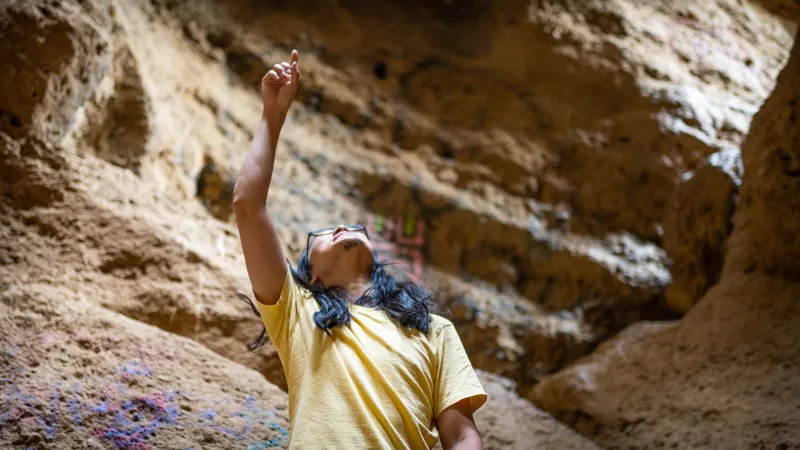
“How do I tell the world Derek Yu is dead? And worse yet – it’s my fault?”
Ridiculous, maybe, but these paranoid questions run through my head as Yu climbs a mountain. No safety gear. No helmet. Just his own hands, sneakers, and determination. I have to follow soon after, and though I’m undoubtedly scared, in the moment, I’m much more afraid of killing the creator of Spelunky than my own mortality. Though you could argue, in this hyper-specific example, the game should’ve been a cautionary tale. In Spelunky, you do die a lot. Nevertheless, I don’t want to be responsible for the death of one of the game industry’s most beloved indie developers.
It’s late April, a hot mid-afternoon day in West Hills, Calif., a neighborhood about a 45-minute drive northwest of Los Angeles. It took about an hour to hike here: the Cave of Munits, which now looms roughly 25 feet above us, a giant fissure in the mountain we stand beneath. We knew we’d have to do some light climbing; the websites we’d read said as much. But now that I’m here, looking into the opening of Munits, I feel they sold it short. To my anxious mind, I’m about to climb El Capitan. It could be 25 feet or 3,000 feet, for all I know. Falling to your death feels the same no matter what altitude you slip from.
“Wow, this really is like some actual spelunking here,” Yu says, the words stressed and labored as he pulls his body weight up.
I hear him panting. I’ve long since stopped watching – finding anything I can around me to look at instead; I don’t want to see the consequences of my negligence. Halfway up, Yu stops to catch his breath. It’s the second half of the climb where things go from bad to worse.
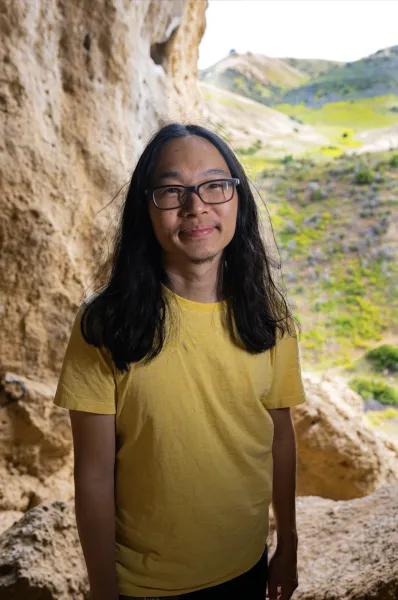 Derek Yu, the creator of Spelunky
Derek Yu, the creator of Spelunky
At the very least, it’s pretty easy to find handholds in the first half. That all goes out the window as you climb the final bit into Munits. The rocks are slick, the gaps wide. You have to really stretch your legs to find leverage. It’s not a 90-degree climb, but I’d wager it’s pretty close. One wrong move, and that’s all she wrote. I start to wonder if Game Informer video editor Alex Van Aken and I have the strength to carry Yu the mile back to civilization. There is, of course, no cell phone reception.
Now is probably a good time to tell you that Derek Yu did not die. Neither did I, for that matter, though I’m sure you assume as much. Once Yu makes it into Munits, I follow suit. The climb is hard and scary, and we consider turning back more than once.
But when I finally make it, I’m thankful we didn’t. Before I look into the cave, I turn around to see the landscape I just traversed. We’re high above some of the other hills in the Simi Valley mountain range. You can see for miles as they rise up and around the earth, the green grass stretching far and wide. If you avoid looking to the left at the nearest town, it feels like you’re truly out in the wild. It’s quiet. The kind that doesn’t exist in cities. The kind you have to go out of your way to experience.
It is – for lack of a better word – perfect. The best view I can imagine after a near-worst case scenario.
Which feels appropriate. Because as far as many are concerned, Yu made a perfect game. About exploring a cave, no less.
Perfect
When Spelunky launched in 2012 – itself a remake of the 2008 freeware game of the same name, but this time financed and published by Microsoft for Xbox Live Arcade – it came at what was then, and may still be, the largest indie game movement. Hotline Miami, Fez, Journey, and of course, Spelunky, among others, all hit the same year. But even against stiff competition, Spelunky is a clear stand-out.
At its core, it’s a game about exploring a cave. The catch: it’s procedurally generated; no two playthroughs are the same. Further complicating matters, it’s a roguelike and brutally difficult. It’s a game you can – and must – play continuously to see everything there is to offer. As Polygon put it in their review back in 2012, “We may be playing Spelunky forever.” It’s hard to argue they’re wrong. Spelunky quickly found an audience.
“I think when it came out, it was a new thing, that mixture of roguelike stuff and platforming,” Yu says. “I mean, really, I feel like it’s just the roguelike philosophy, but Spelunky really made it accessible to a lot of people.”
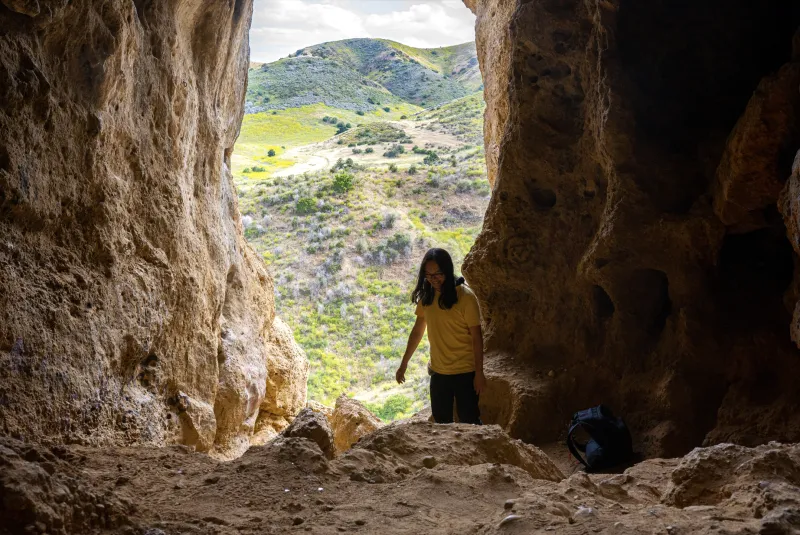
By all estimations, Spelunky was very successful. He doesn’t give exact numbers, but if you factor in the freeware version with the XBLA release, Yu says “millions” of people have played his game.
And a decade later, more so than many of its contemporaries, Spelunky is a game people still discuss. Of course, it helps that a sequel debuted in 2020, renewing interest. But part of that public consciousness comes from Yu himself. Over the last 10 years, he’s been remarkably open about the game’s development and given numerous in-depth talks. There’s also an entire documentary by Noclip about the making-of the project. Hell, he even wrote a book, aptly titled Spelunky, published by Boss Fight Books in 2016, chronicling the development in meticulous detail. People love Spelunky, and they love hearing Yu talk about Spelunky. I guess that’s what happens when you release a “perfect” game.
I want to interrogate that word – “perfect.” It’s loaded, inherently holding massive weight. And yet, more so than perhaps any other game, it’s the word used to describe Spelunky. It’s so synonymous that the back of Yu’s book even references it. “But how is a ‘perfect’ game made?” it asks. Read the book to find out. I’m here to ask Yu something else. How does that term affect him as a creator? How does he deal with it and think about it?
“I think when I heard the word perfect, I didn’t feel like the people who said it meant perfect-perfect, like, there was absolutely nothing that could possibly be improved or changed,” Yu says, sitting atop a large rock inside Munits. “But I took it to mean that they felt like it got pretty close.”
“When I heard it, I was obviously very flattered,” he says. “But to me, it’s also a dangerous word. I think in making art, making games, and just in my everyday life, I try to – there are some pigeons behind me in this cave.”
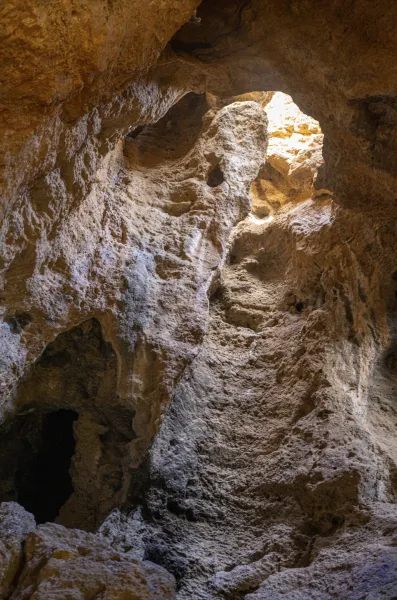
The inside of Munits where we’re talking is almost comically beautiful. Tall rocks stacked on top of each other make a natural staircase to ascend further into the cave. Holes in the ceiling allow sunbeams to funnel through – as if God herself was lighting our path. At the very back is a black hole we opt not to explore. The ceiling is high, the echo loud. It’s like we’re in our own private cathedral inside a mountain. We’re lucky, and we have the place to ourselves for the hour we’re here.
Except for these damn pigeons.
As Yu cuts himself off, behind us, deep from the back hole, we hear what I can only describe as the worst sound I’ve ever heard: the low echo of dozens, maybe hundreds of pigeons all cooing together. It’s low, otherworldly, and terrifying.
“It sounds like the pigeons are using walkie-talkies or something,” Yu says, laughing. “It’s so weird.”
I agree. It’s unlike anything I’ve heard before, ostensibly because of the cave’s shape warping the sound into something unnatural by the time it hits our ears. Occasionally, one of the pigeons flies out from the hole, directly over our heads and into nests and smaller crevices surrounding us.
It goes on like this. We talk for a bit; then pigeons interrupt us. We look at each other to commiserate over how terrifying the sound is; then we carry on. To Yu, this conversation, and how it goes against the plan, gets at his feelings about making a perfect game.
“I guess that’s a good segue to me saying that I think it’s important to just kind of embrace imperfection and the chaos of life,” Yu says after the pigeons settle down. “And I certainly didn’t feel like Spelunky was a perfect game myself. I think it felt like the very best that we were able to do at the time. But I could certainly see – especially by the release of Spelunky on Xbox [360 in 2012] – that we learned so much that I definitely felt like I could do better. That we could all do better.”
But that also meant learning to accept his flaws.
Imperfect
Finding the first mistake always feels the worst, Yu says.
But it’s always there and will always be there. No matter what Yu creates, he always finds the first blemish that made it past his watchful eye as soon as it’s done.
“Up until that first mistake, it does kind of feel like you did something perfect, and when there’s one mistake, it kind of feels like this perfect thing with this one blemish on it,” Yu says. “That feels really bad.”
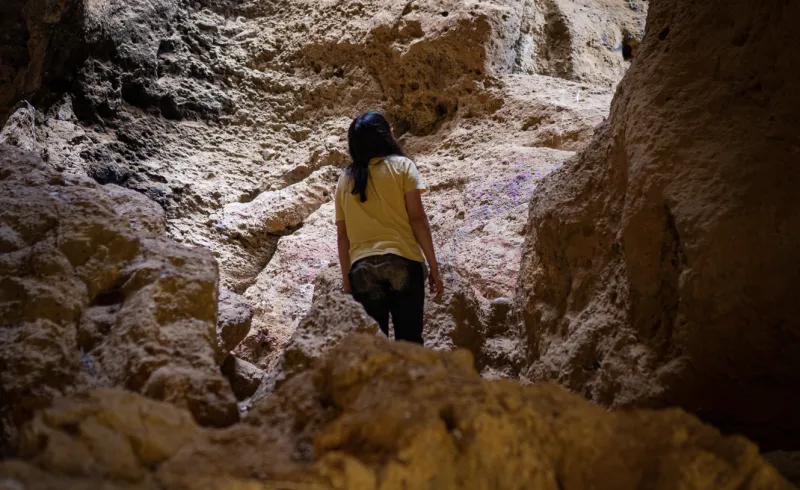
I think I get what he means, if only because this whole day isn’t going how I’d imagined. For months I’d planned this piece out in my mind. It went something like this: we’d show up, and the sun would be in just the right position to cast the perfect amount of shadows across the landscape. Munits would be impeccable. We certainly wouldn’t have to leave most of our filming equipment behind because it’s too heavy to carry up – a victim of not knowing what the actual climb is like. Every time Yu opened his mouth, it would be perfectly quotable. No “likes,” “ums,” or half-finished thoughts and ideas. I’d go home, and the piece would fall out of my fingers. Easy.
And to be fair, some of this is happening. Derek is incredibly smart and insightful. Munits is beautiful. The sun isn’t doing us a ton of favors, but at the very least, it’s not raining or overcast. If you squint, everything I’d imagined is almost playing out how I wanted.
But then a pigeon flies over your head and interrupts a fantastic answer – the kind that’s never replicated once forced. Or you notice all the bugs and bird poop on the ground beside you. Or while capturing aerial footage, Alex crashes his drone in Munits and has to climb back into the cave after it. Or the fact that I somehow forgot a water bottle. My perfect day for my perfect piece is now decidedly imperfect.
People have told Yu he made something perfect for a decade now. And yet, 10 minutes into talking to him, he lets us know how Spelunky is not perfect. But it’s not that he’s trying to diminish his accomplishments – quite the opposite. Finding the first blemish, as he says, is painful; it feels bad. But it’s going to happen. And it won’t be just one.
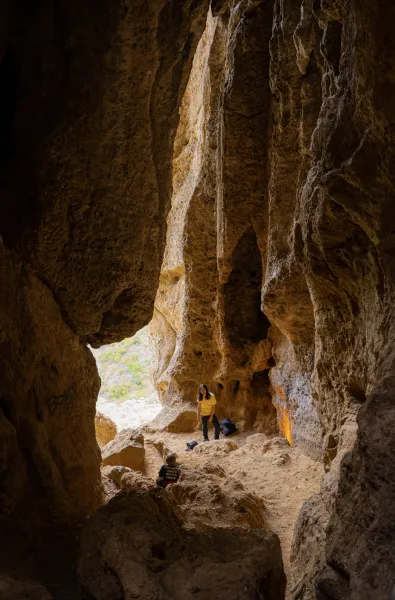
“Inevitably, I’ll find something else that is a little awkward,” Yu says. “And then something else. And then I’ll think about a previous game or piece of art that I made. ‘Oh yeah, there were problems with that, too.’ And then you just realize that nothing is perfect, and you start to actually appreciate some of these quote-unquote flaws as actually the human touch. That’s my personality coming through. At the time, I chose to do it this way, and that’s what I was feeling. Or maybe there was some pressure on me, some time pressure, and I just had to do it that way at that time. It ends up just making the work, I think, feel more rich in the end. I really just try to embrace that.”
Embrace and build, actually. For many people, Spelunky might be a “perfect” game, but for Yu, there was plenty to improve upon – which is why he created Spelunky 2. As he tells it, he didn’t set out to reinvent the wheel; he wanted to build upon it. When he thinks about people’s opinion of Spelunky as “perfect,” rather than read that as it can’t get any better, Yu says he looked at it as a foundation for its sequel; the start of something better than perceived perfection.
It’s honestly a healthy way to look at the artistic process. I tell Yu that if someone called anything I’ve created “perfect,” I’d surely let it go to my head; I’d get an ego about it. I’d also be too scared to create anything again. Yu, more rational and more thoughtful than I, chooses to look at it from a better angle.
“I think I was just really excited about the idea of the further things that I wanted to do,” he says. “With Spelunky 1, people had no expectations. With Spelunky 2, people are going to have a lot of expectations going into it, right? So, inevitably, you’re going to disappoint people. But I felt that if people thought Spelunky 1 was a perfect game, they can keep playing that.”
Make It Work
I’m the first to climb down. As scary as it was going up, it’s mortifying working your way back from Munits. I feel like if I tip my weight just one degree too far, gravity will take the wheel, sending my body to an early end. In retrospect, I’ve spent a lot of my day thinking about dying.
Today wasn’t perfect. My piece likely won’t be, either. But the pigeons, the climbing, how this whole ordeal went south in ways I never could’ve anticipated? It made today memorable, fun, unique, and interesting. It might make my job harder in the coming weeks – a lot of good quotes got ruined by pigeons – but it also beats writing another preview round-up entry. In that case, I can buy Yu’s philosophy and embrace the chaos and imperfections of life. At the very least, I got some good anecdotes. Yu seems to agree.
“This is definitely up there as far as surreal experiences go,” he says as we work our way back to civilization.

The exhaustion and stress of the day wear on us as we hike the way we came; our bodies and conversations are slower than they were a few hours ago. Interview questions melt into small talk, mostly about how strange this trip has been. It was, admittedly, poorly planned. Imperfect, you might say. Or perfect in its own way. All a matter of perspective.
What does perfection mean? A few weeks ago, I thought I’d have an answer by this point. Yu made a “perfect” game. Surely he could enlighten me. I don’t think he did, but I don’t think that matters. I don’t think perfection means any one thing so much as it means something different to each person. For you, Spelunky might be a perfect game. For Yu, it isn’t. But that’s okay. Nothing is actually perfect – even if people say it is. It’s just a matter of embracing that fact.
“I think a lot of indie developers – especially when they’re starting out – I think it’s easy to think about the game you’re working on as like, ‘This is it. This has gotta make or break me. This has gotta be my magnum opus,’” Yu says. “It’s easy to get into this cycle of working on one thing forever and ever because your skills grow as you’re developing, and what you worked on a year ago may not look as good to you now as it did back then.
“I think it’s important to realize that it’s fine. I think that a big part of not succumbing to perfection is just thinking about things this way. It’s okay if it’s not perfect. It’s okay if what you worked on at the beginning of the game development [cycle] is not as good as what you’re working on at the end of development. You just find a way to make it work.”
Again, it’s all a matter of perspective.
source https://www.gameinformer.com/documentary/2023/03/07/exploring-caves-with-the-creator-of-spelunky
